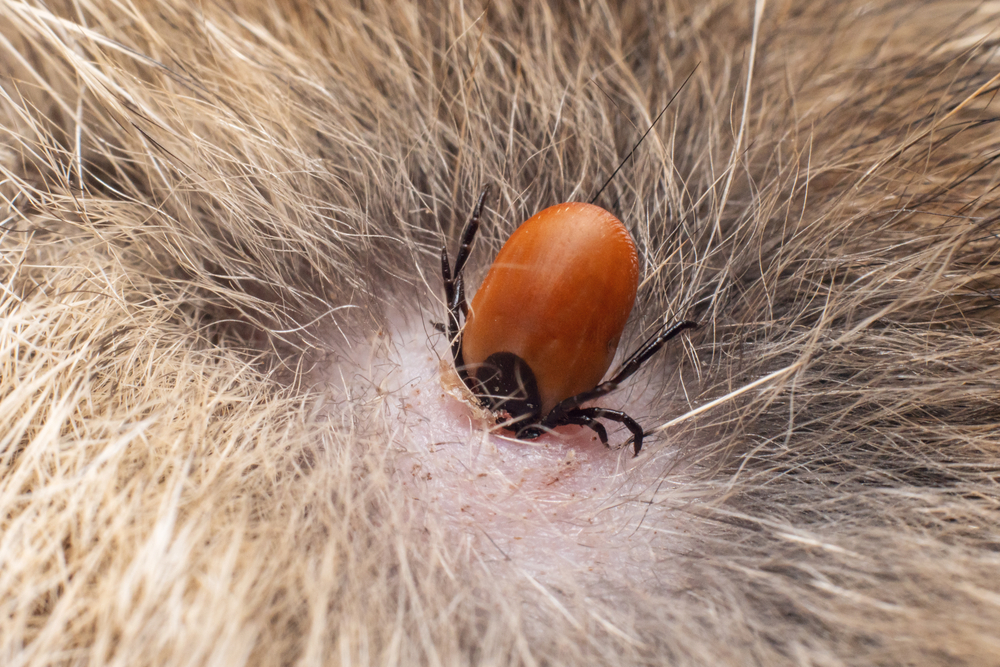Lyme disease is a serious threat for dogs and people, and can cause lifelong health effects after an initial infection. To help you and your four-legged friend stay safe, our Mount Pleasant Animal Hospital team wants to share important facts you need to know about Lyme disease.
#1: Lyme disease is a year-round threat for pets
South Carolina’s relatively balmy temperatures are the ideal climate for a tick population explosion, with no respite during our mild winters. While the majority of tick infestations occur during the late spring, summer, and early fall, they can take place all year long. Whenever the temperature is above 35 degrees, ticks will actively seek a meal.
#2: Lyme disease is spreading across the country
Although Lyme, Connecticut, is considered the birthplace of Lyme disease, this tick-borne illness is now widespread across the United States as the climate, tick populations, and wildlife habitats change. South Carolina is not far from the Lyme disease hotbed of New England, and the disease is spreading ever westward, causing problems for the entire country.
#3: Not all tick species carry Lyme disease
Ticks can carry a plethora of pathogens, but only black-legged ticks and Western black-legged ticks carry the bacterium that causes Lyme disease. However, these Ixodes ticks can also carry other serious diseases, like anaplasmosis, babesiosis, and Powassan virus.
#4: A tick must attach for more than a day to transmit Lyme disease
It’s a common misconception that ticks immediately transmit disease when they bite. While soft ticks can pass on disease in 15 minutes, hard ticks are usually problematic for pets, because the pathogens they transmit take much longer to spread. For example, black-legged ticks must remain attached for roughly 48 hours to transmit Lyme disease.
#5: Lyme disease can infect pets for life
If your pet develops clinical signs of Lyme disease, they will likely receive an antibiotics course, although antibiotics do not fully eradicate bacteria from your pet’s body, especially the kidneys. Antibiotics can improve your pet’s condition initially, but your furry pal may suffer from relapses throughout their lifetime.
#6: Ticks do not fall out of trees to attack your pet
Many people believe ticks fall out of trees on their unsuspecting prey, when, in reality, ticks “quest” for their next meal. They will crawl up tall grass, weeds, and other vegetation, wave their legs about, and seek to snag a ride on an animal or human who walks past. Once aboard, the tick will generally climb upward for their meal, looking for the best spot, such as in and around the ears, under the collar, in the armpits or groin, or under the tail or, occasionally, between the toes. Check your pet thoroughly when they return indoors.
#7: Environmental management is key in preventing tick-borne illnesses
When outdoors, reduce your pet’s potential for picking up ticks to prevent parasitic infections. Manage your environment by:
- Mowing — Keep your lawn mowed, so grass and weeds do not grow too tall.
- Clearing — Clear leaf litter and other vegetative debris from your yard to discourage ticks and small mammals.
- Building — Build a barrier between your yard and a wooded area with cedar chips, mulch, or rocks laid down between the two locations. Ticks will be much less likely to cross this barrier.
#8: Lyme disease can be difficult to spot in pets
While Lyme disease commonly causes a bullseye rash in people, this classic sign is not seen in pets, who are more likely to exhibit a shifting leg lameness and lethargy. Other Lyme disease signs in pets can include:
- Fever
- Swollen lymph nodes
- Anorexia
- Swollen, painful joints
In rare cases, kidney disease can develop, causing excessive thirst and urination, and nausea and vomiting in affected pets.
#9: Most tick preventives do not repel ticks
Oral products and topical applications typically do not prevent ticks from crawling through your pet’s fur, but they will kill the tick after it bites. This prevents disease transmission to your pet, since preventives kill attached ticks hours before transmission can occur.
#10: A Lyme vaccine is available for dogs
If a black-legged tick manages to get through all your dog’s defenses, a Lyme vaccine is available to help prevent disease transmission. This vaccine can also be given to dogs who previously contracted Lyme disease to prevent potential future re-infection. Ask our veterinarian if the Lyme vaccine is right for your dog.
Lyme disease is a serious illness with lifelong effects that you do not want your pet to contract. Contact our Mount Pleasant Animal Hospital team to discuss the best options for protecting your furry pal from tick-borne illnesses and whether the Lyme vaccine will benefit your pet.








